The Black Keys on the Kmart pomade, dirt weed, and haunted tire factories that shaped their sound
- Oops!Something went wrong.Please try again later.
- Oops!Something went wrong.Please try again later.
EW's 2022 Summer Preview has exclusive looks at the most anticipated TV shows, movies, books, and music of entertainment's hottest season. Continue to visit ew.com throughout the week for more previews of what you'll be watching, reading, and listening to in the months to come.
Two guys, 20 years, 11 studio albums: It's been a long road from Akron, Ohio, to the gold records and fistfuls of Grammys that Dan Auerbach and Patrick Carney have earned since their scrappy blues-rock act the Black Keys first emerged from the basement bowels of their Midwestern hometown in 2002.
These days they're respectable Nashville residents, husbands and fathers in their 40s with a new album, Dropout Boogie (out May 13), and a months-long summer tour launching July 9 in Las Vegas, with support by Band of Horses. On the cusp of Boogie's release, the duo looked back at the haunted tire factories, Captain Beefheart records, and cans of Kmart pomade that made them.
<i>The Big Come Up</i> (2002)
PATRICK CARNEY: We didn't really know anything about making an album. We made the record on this thing called an Akai DSG16 — a digital 16-track we got from Sam Ash or something on a credit card — and then bought these Chinese microphones that were just garbage. The only way we could get the stuff to sound right was to plug it into this Maestro fuzz pedal we had. We did a lot of experimenting just to try to make the recording sound —
DAN AUERBACH: Trashy in the right way. That was really important to us.
CARNEY: Coloring the sound was really hard to do back then on digital equipment. It sounded so sterile that we spent the whole time just trying to get it to sound crunchy. Now, if you listen to that first record, I mean, it sounds like someone found it buried in their backyard. [Laughs]

<i>Thickfreakness</i> (2003)
CARNEY: We signed to Fat Possum in December of 2002, and they basically said, "If you can get us everything by December 15, we can have the record ready to come out by spring." So we had to do a cover, and we didn't have any ideas. My brother Mike and I drove to the Super Kmart in Akron at like 1 in the morning, and we're just walking through the store looking for inspiration. I saw the jar of Royal Crown Hair Pomade, and we bought it, and then we did a little photo shoot in my apartment, and Michael scanned it, and it seemed perfect. He made that cover in like two days.
AUERBACH: Perfect. I love that album cover. It's one of my favorites.
CARNEY: We made that record in one day on this antiquated four-track and little eight-track, and then I put all the files into this digital recorder so I could recall the mixes and make it sound much worse. [Laughs] Dan was just moving into a house with his girlfriend that weekend, so I would make a mix and then drive it over to his house and then go home and he would call and be like, "Turn the guitar up," and I'd remix it and drive it back over. This was pre-email, really. Like pre-"being able to send the songs."
AUERBACH: Yeah, CDRs.
CARNEY: I think of that 14 hours [it took to record the album], at least five hours is me driving to Dan's house. [Laughs]
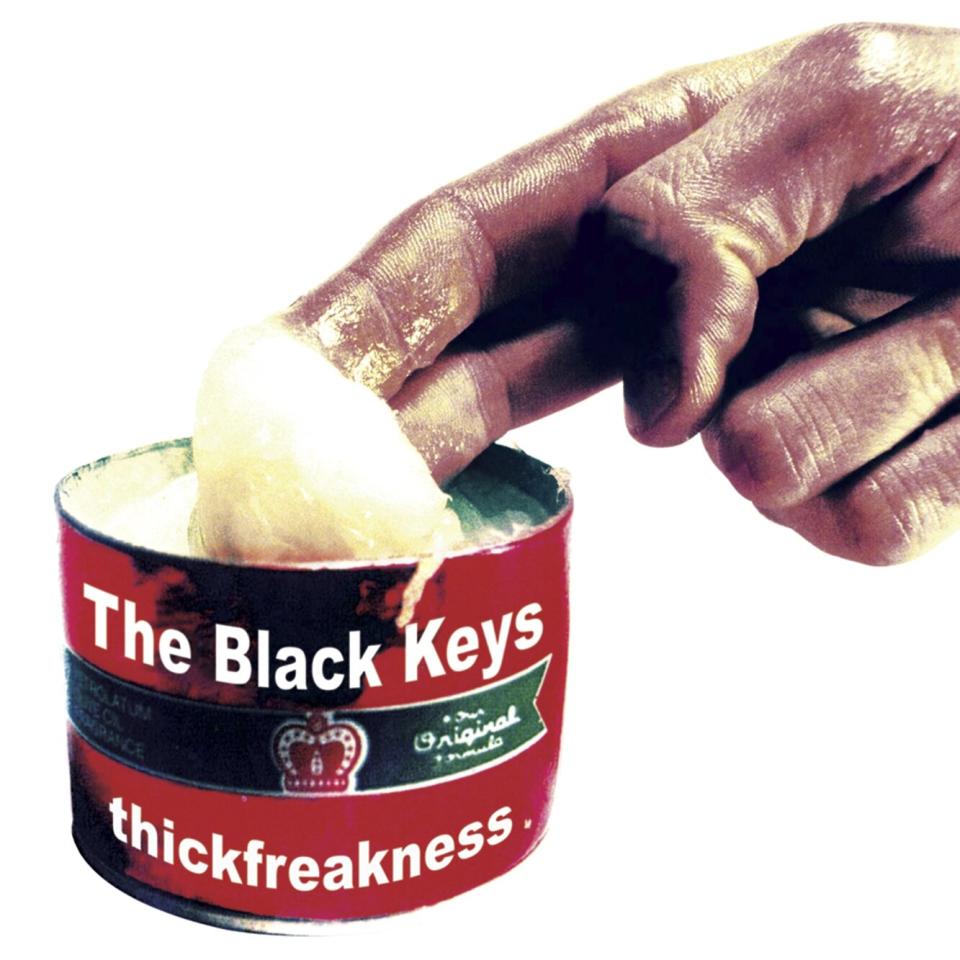
<i>Rubber Factory</i> (2004)
CARNEY: It's very literal, the title. We recorded Rubber Factory at an old General Tire factory that had offices on the second floor. All the tire companies you can think of — Firestone, Goodyear, General Tire, BFGoodrich — for some reason, were headquartered in Akron.
AUERBACH: We went to Firestone High School.
CARNEY: This real estate agent that my mom knew said he could get us into this rubber factory. So we went and checked it out and it was $500 a month, which I think we had a little sticker shock on that. It was kind of expensive, but we had access to probably 50,000 square feet. We could do anything we wanted up there.
AUERBACH: Just a giant, frightening building. We were so scared to be there alone at night. It was straight out of a horror film, a mad scientist laboratory. With the water dripping in the hallway...
CARNEY: It was like something out of Rick and Morty. There was an exploded laboratory with eye-wash stations everywhere, and then if you went down this probably 300-, 400-foot-long hallway, there were holes in the floor and you could see that there were still stacks of, like, ghost tires. Do you remember that?
AUERBACH: Yeah. [Laughs]
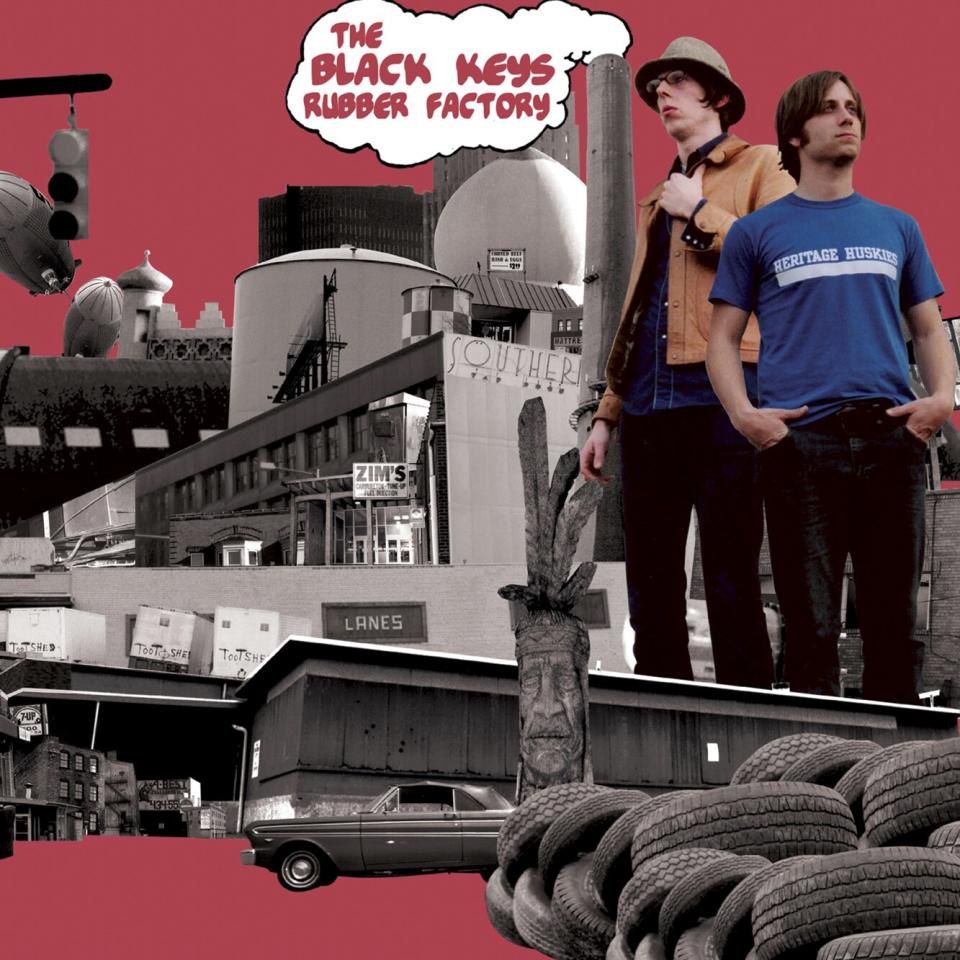
<i>Magic Potion</i> (2006)
CARNEY: We learned a lot making that record, and one of the things we learned was: Don't let it get mastered for $300 just to save some money. But it was big for us, because it was our first major-label record. I think we started becoming aware of the limitations. We had kind of pigeonholed ourselves by having the duo situation, and so we changed our approach big-time right after that. But when I hear something like "Your Touch" on Eastbound & Down, I still think it sounds dope.

<i>Attack and Release</i> (2007)
CARNEY: [On working with producer Brian "Dangermouse" Burton for the first time] He wanted us to write some songs and have Ike Turner sing them. It was going to be like a Ike Turner return to form. So we started working on stuff and sending it to him, and then I think we first met him when we played Coachella in 2007. Later, I flew out to L.A. for a weekend and called him, and without actually asking Dan first, I asked him if we could just take these [Turner] songs and do a Black Keys record, and if he would consider producing.
AUERBACH: He just has such an ear for music and hooks and stuff like that. But he gave us a lot of confidence — I think we didn't even realize what we were capable of until we met Brian, do you know what I mean? He opened our eyes to all the possibilities we had every time we stepped in the studio.
CARNEY: It was like hanging out with the older brother we never had. There was a lot of ball busting, and he taught us a lot.

<i>Brothers</i> (2010)
CARNEY: I knew going into the studio to make Brothers that we needed to... let me put it this way: Dan had just made his first solo record and I think there was an emphasis on pushing ourselves. We both had just turned 30. Dan had a toddler and we had to take it a bit more seriously.
AUERBACH: We wanted to get out of town to make a record — maybe go to some sort of historical studio, something that was inspiring. And we talked about going to Sam Phillips in Memphis for a long time, and then right at the last minute, the guy we were working with said we should go to Muscle Shoals Sound. So we rent a car, pack it full of stuff, go down, and it's basically like being in Pat's basement when we first started. [Laughs] I mean, it was identical. Hard surfaces everywhere, no treatment, no instruments.
CARNEY: Literally nothing worked.
AUERBACH: But there's something magical about that city. I don't know what it is, but it just drew it out of us. As soon as we got there we started recording and making songs, and it was flowing really easy.
CARNEY: We had been smoking this really shitty Alabama weed —
AUERBACH: As soon as we started smoking it, we requested a harpsichord. Neither of us played the keyboard.
CARNEY: Our manager showed up the next day with a harpsichord and this weed called Train Wreck. And literally I took one puff of it and just felt like my body and mind had parted ways with each other and spun me out. It was too much for me. [Laughs]
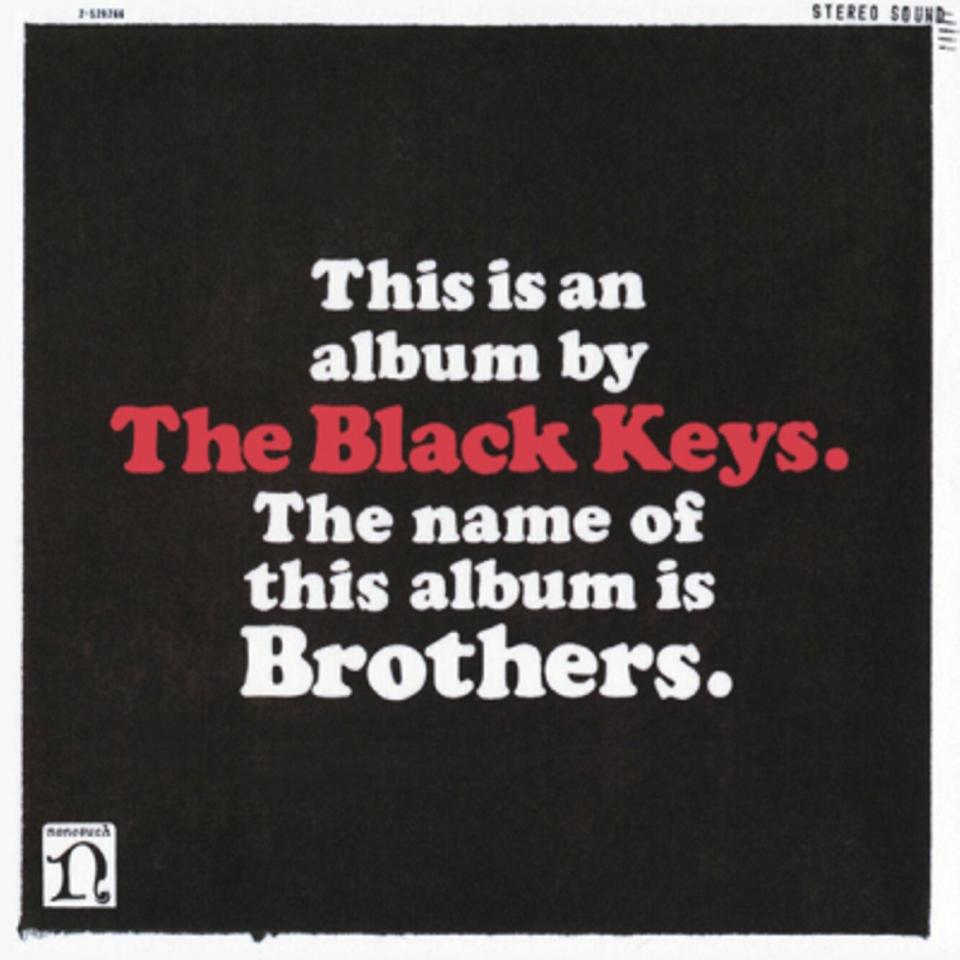
<i>El Camino</i> (2011)
AUERBACH: [For the single 'Lonely Boy'] we actually spent a couple of days shooting a video with different locations and different actors. One of the main actors was Bob Odenkirk, and it was this huge production. And then we got the final cut and it was just a stinker, really, but we'd remembered being there when they recorded Derrick [Tuggle, an extra] dancing and he had the entire place cracking up. And so we asked to see that footage and ultimately we just made this gut decision, because it was just the most entertaining thing. It was one take, so special. I love that moment. And I love Derrick, too.
CARNEY: I still message with Derrick probably about once a week. And we spent like $85,000 on that video, literally for one shot. But Dan was adamant about it, and it was the right call. And I think it's got, like, 130 million YouTube views or something.
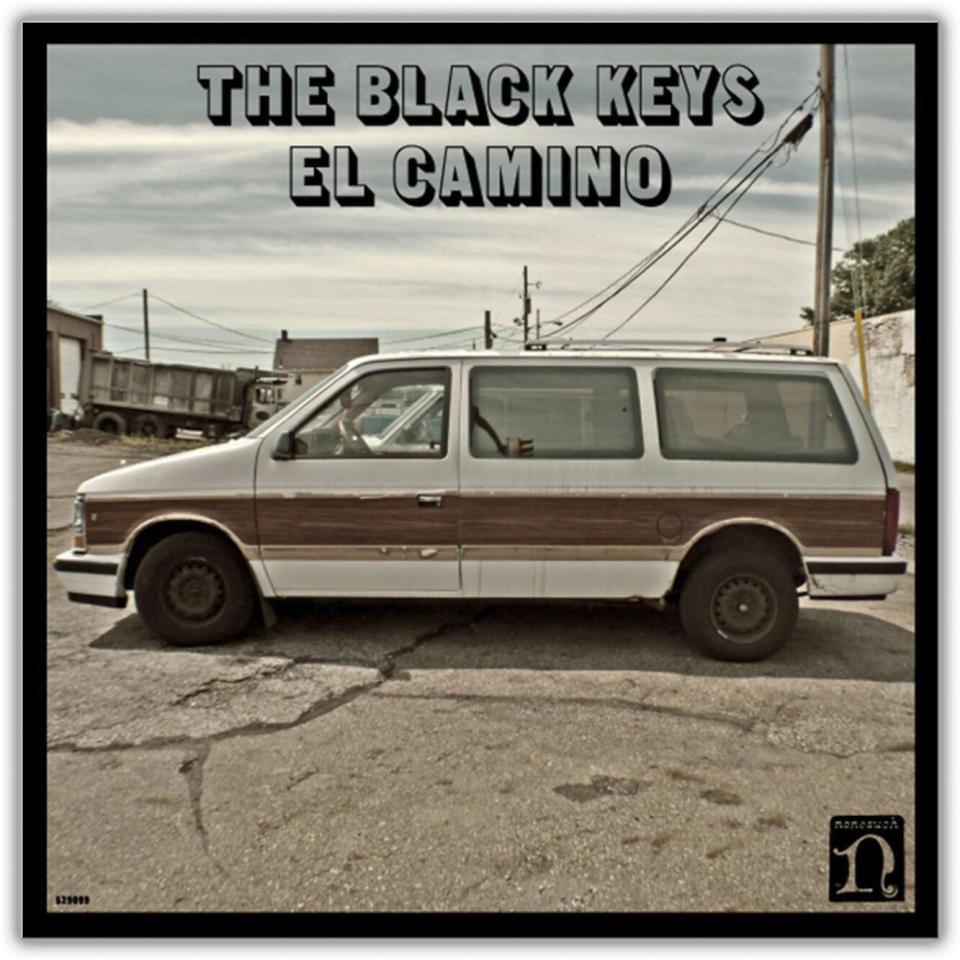
<i>Turn Blue</i> (2014)
CARNEY: [On their evolving press campaigns] When we announced El Camino we put an ad in the Akron Weekly Journal for a used minivan, and a couple of people actually figured it out. So we were just trying to do something fun, and at the time it seemed very random to have Mike Tyson tweet out a link. Eric Wareheim directed a really creepy promo, but one thing we learned about promo was that sometimes you need to be a little bit more forward.
At one point we were doing some serious prank stuff that we should have done more with. The last time we played SNL was for Turn Blue, actually, and I didn't want to go out the night before, so I stayed in my hotel room and just made a bunch of prank calls. Some of them were really amazing. I was prank-calling KFCs saying I was a secret taster and that I could only detect 10 herbs and spices. And then I would call back and be like, "Did you just get a call from corporate?" And they're like, "Yeah," and I was like, "That's actually someone from Popeyes. Ignore what they just said. We're one step behind them all day." Awesome.
AUERBACH: Very effective. [Laughs]
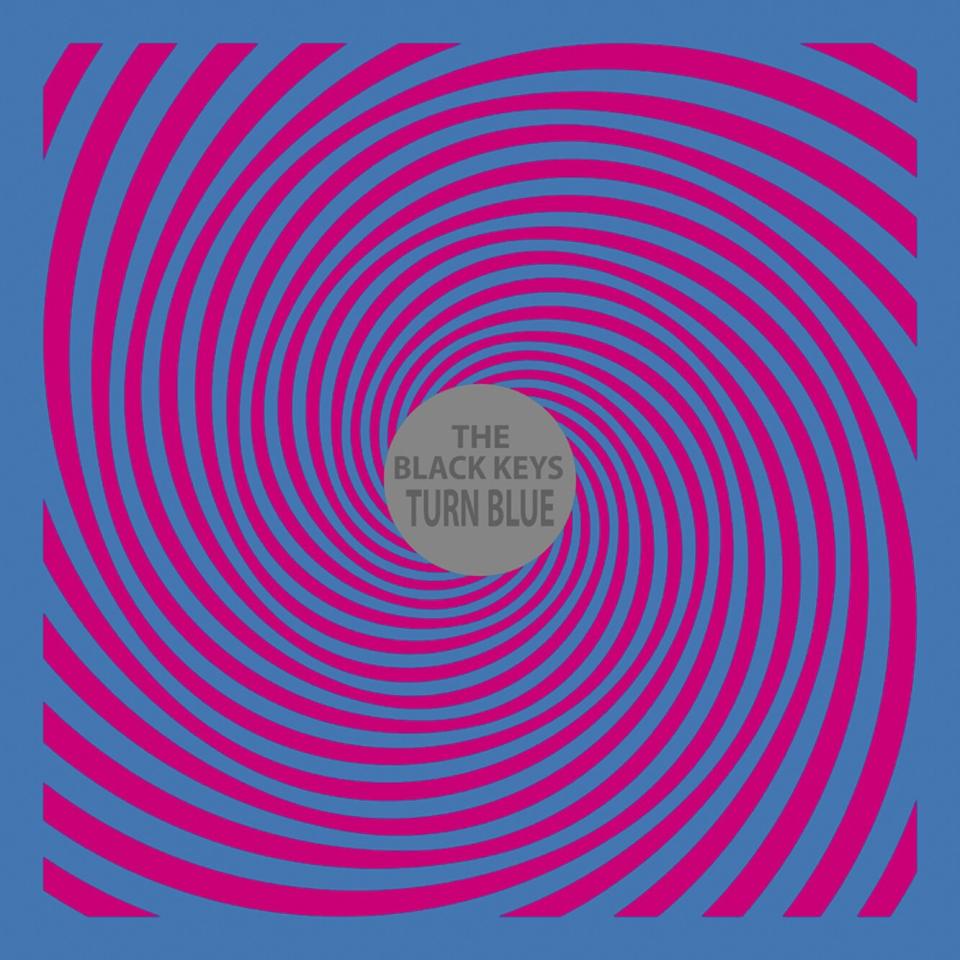
<i>'Let's Rock'</i> (2019)
CARNEY: In early 2015, I broke my shoulder, causing us to cancel a bunch of dates, which is probably a very good thing because we were fried already. Dan did a solo record, and we took 2016 and 2017 off. I think we only even chatted once — we were just really giving each other space. And then around early, mid-2018, we made plans to make another record. 'Let's Rock' was our first time in the studio together in five years. Really, most importantly, it was our first time without a producer in a long time. So it took us a minute to get things back. It wasn't a struggle — just finding the point of view. I think it's like Magic Potion to me. It was a transitional record. But I still think "Lo/Hi" is one of our best songs.

<i>Delta Kream</i> (2021)
AUERBACH: [On getting a shot by the famed American photograph William Eggleston for the cover] We thought it would be impossible. We're such huge fans.
CARNEY: It's priceless. I kept telling Dan we could never afford it.
AUERBACH: But we reached out and our manager explained what the record was and who was on it, that it was a tribute to these northern Mississippi musicians. And this is where a lot of Eggleston's photos were taken, so they loved the idea of the project and just let us have the photo.

<i>Dropout Boogie</i> (2022)
CARNEY: The title is a reference to a Captain Beefheart song [from the album Safe as Milk] —
AUERBACH: Which is a record we bonded over early on when we were on tour together, just the two of us. That was one of the records we kept coming back to.
CARNEY: We would listen to it all the time. And we took kind of a… I guess they would call it a heroic dose of psychedelic mushrooms once on tour, and that was the song that scared the living s--- out of us.
But [in terms of the album cover], Dan's daughter's in high school and my stepdaughter is in high school. We were talking about our high school experience and how insane it was — like kids getting thrown through trophy cases and absolute madness — versus what our kids are experiencing. And so we wanted to do a video that was not mocking today's high school students, but maybe trying to show what kind of trouble they could get into. I was like, "Yeah, we can play the teacher and the guidance counselor!" and Dan's like, "No, man. We dropped out of school. We'd have to be the janitor and the cook."
AUERBACH: That's pretty much it.
CARNEY: Dan had become friends with this photographer, Jim Harrington, who takes amazing portraits...
AUERBACH: Jim was sending us these photos — these turn-of-the-century portraits of factory workers, bakers, custodians — and we just loved how they looked. So we tried to put that together, and then we tied it in with the video, which is the first time we've ever done anything like that, but it was fun. Do our kids think we're cool? Hell, no. My daughter's 14. She shakes her head at me all the time. Every day.
CARNEY: Dan has a soon-to-be 7-year-old boy. I can tell he thinks his dad's cool, and I think my son thinks I'm cool too. But when they get to be 16, they won't think that anymore. [Laughs]

Sign up for Entertainment Weekly's free daily newsletter to get breaking TV news, exclusive first looks, recaps, reviews, interviews with your favorite stars, and more.
Related content:

